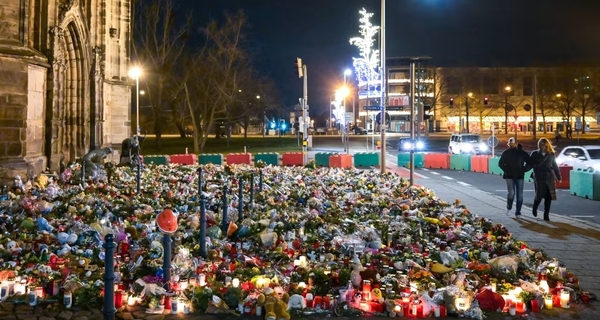Few things foster a sense of common humanity as much as the adherents of one religion offering warm holiday wishes to members of another. Yet some people reject this geniality on principle. Islamists—Muslims intent on returning to a medieval law code—despise any holiday not sanctioned by Islam. This archaic and bigoted attitude provides context for the New Year's Day massacre in New Orleans that left 14 dead and dozens injured.
Islamic theologians of the Middle Ages set out the general approach. Ibn Taymiya (1263-1328) argued that joining non-Muslims in their festivals is equivalent to "agreeing to infidelity." His student Ibn al-Qayyim (1292-1350) specified that congratulating non-Muslims on their holidays "is a greater sin than congratulating them for drinking wine, having illegal sexual intercourse, and so on."
Of all infidel holidays, Islamic authorities most detest Christmas, when Christians believe God became man. As historian Raymond Ibrahim has noted, these theologians, who believe that polytheism is the ultimate sin in Islam, consider Christmas "the biggest crime ever committed by humanity."
Modern authorities echo those medieval interpretations. Yousuf al-Qaradhawi, a spiritual leader for the Muslim Brotherhood, called celebrating Christmas tantamount to the nation of Islam "abandoning its Muslim identity." Saudi professor Fawzan al-Fawzan called the Dec. 26, 2004, Indian Ocean tsunami "Allah's punishment." He reflected: "It happened at Christmas, when fornicators and corrupt people from all over the world come to commit fornication and sexual perversion."
A former senior manager of Qatar Charity, which describes itself as "one of the largest humanitarian and development organizations in the world," informed Muslims in 2019 that Christmas and New Year's both "contravene Allah's Sharia." He added that "one must not participate in them or cooperate with people who celebrate them," for "partaking in their celebrations is tantamount to taking part in a crime and in aggression against our religion."
Islamist leaders in the West regurgitate these pronouncements. French imam Younes Laaboudi Laghzawi deems it "forbidden to celebrate Christmas or New Year's Eve. Canadian imam Younus Kathrada holds that a person who charges interest, lies, engages in adultery or murders has done "nothing compared to the sin of congratulating and greeting non-Muslims on their false festivals."
In the aggregate, these leaders have legitimated Islamist violence against non-Muslims on their holidays. This can be symbolic. A group of Islamists in Turkey in 2016 put a gun to the head of a man dressed as Santa Claus, explaining that they wanted to encourage "people to go back to their roots." Yet the violence can be real too. Consider the past 11 years:
- A Christmas market attack in Nantes, France, on Dec. 22, 2014, killed one and wounded 9.
- A Christmas party attack in San Bernardino, Calif., on Dec. 2, 2015, killed 14 and wounded 22.
- A Bastille Day attack in Nice, France, on July 14, 2016, killed 86 and wounded 434.
- A Christmas market attack in Berlin on Dec. 19, 2016, killed 12 and wounded 48.
- A New Year's Eve attack in Istanbul on Jan. 1, 2017, killed 39 and wounded 69.
- A Halloween attack in New York City, on Oct. 31, 2017, killed 8 and wounded 13.
- A Christmas market attack in Strasbourg, France, on Dec. 11, 2018, killed five and wounded 11.
- A Christmas market attack in Magdeburg, Germany, on Dec. 20, 2024, killed five and wounded more than 200.
- A Christmas celebration attack in Lahore, Pakistan, on Dec. 25, 2024, wounded three—a week before yet more violence in New Orleans.
There are at least three observations to make about this squalid history.
First, in my understanding, each perpetrator of this holiday-related violence exhibited sudden jihad syndrome—that is, they were normal-seeming Muslims who abruptly became violent. This makes preventing such attacks nearly impossible through police work. Only the systematic exclusion and repatriation of Islamist immigrants, including imams, can begin to address this menace.
Second, given the foreign background of most perpetrators, Western governments stand culpable of not simply failing to stop illegal migration but also irresponsibly opening the floodgates to legal Islamist immigration.
Finally, Westerners tend to worry about Islamism in the immediate aftermath of jihadist violence—only to ignore it until the next spasm of violence. Can't we keep this civilizational threat in mind even when the knives, guns and bombs aren't in use? Doing so is essential to taking consistent, effective action against today's most dynamic totalitarian ideology.
 The memorial site on Dec. 31, 2024, at St. John's Church in Magdeburg, Germany for victims of the Christmas market attack. |
Jan. 9, 2025 update: Raymond Ibrahim, whom I cite in the article above, builds on this topic by citing numerous examples from Egypt.